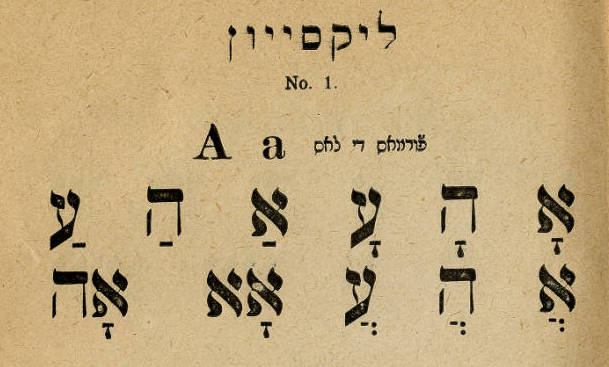Sephardic U was recently launched to decode the cultural, spiritual and intellectual DNA of our great Sephardic heritage. Unlocking the wisdom and timelessness of this tradition involves being able to accurately express the thoughts of great Sephardic leaders in English and in the Latin alphabet, used by a majority of people in North America, South America, and Europe. To address this challenge, and to provide a useful tool for our Sephardic brothers and sisters throughout the globe, Sephardic U has endeavored to create a transliteration system for expressing the Sephardic dialect of the Hebrew language in Latin characters. This post presents the work of several of our members and leaders.
We first present a guideline to how to transliterate. This is the result of a recent class I offered for Sephardic U called “Transliteration: How do I write שִׂמְחָה in English?” in which we discussed the necessity of transliteration, its purpose and limits, and guidelines to the best possible system. The following points are a summary of that class.
Transliteration Tips
- Know that there is no such thing as a perfect transliteration system
- Know your audience!
- This will determine the specificity of your system
- One, different Latin letter (or digraph) for each Hebrew letter
- Except sin and samekh
- Be consistent!
- Knowing the purpose and audience of your system will help you maintain consistency.
- Being inconsistent will confuse your audience
- Keep in mind the symbolic value of your choices.
In that light, TVA proposes the following as a general guideline to transliterate Sephardic Hebrew for the academy and bet midrash.
Phonetic realizations are represented by [b] whereas graphemes (alphabet letters) are represented by (b).
- Alef – no symbol
- Bet – (b) or (v) depending on pronunciation
- For communities that do not distinguish [b] and [v] the letter (b) will suffice
- Gimel – (g)
- If communities maintain a separate pronunciation for gimmel without a dagesh, it should be written (gh)
- Dutch Sephardic Jews pronounce gimmel without dagesh as [kh] and can write either as (gh) or (kh)
- Dalet – (d)
- If communities maintain a separate pronunciation for dalet without a dagesh, it should be written (dh)
- He – (h)
- Final letter should always be maintained
- Torah (mitzvah, Hanukah) Shabbat (Shabat)
- Vav – (v)
- Communities that pronounce this letter as [w] should write as (w)
- Zayin – (z)
- Het – (h)
- Tet – (t)
- Yod – (y)
- Kaf – (k)
- Khaf – (kh)
- Lamed – (l)
- Mem – (m)
- Nun – (n)
- Samekh – (s)
- Ayin – ’
- Examples: Shema’, ma’ariv
- Spanish and Portuguese communities as well as Italian Jews might choose to write (ng)
- Pe – (p) or (f) depending on pronunciation
- Tsadik – (ss)
- Qof – (q)
- Resh – (r)
- Shin/Sin – (s) or (sh) depending on pronunciation
- Tav – (t)
- If communities maintain a separate pronunciation for tav without a dagesh, it should be written (th)
Certain communities will wish to retain their traditional pronunciation and those have been maintained in this system.
When transliterating for published articles, the dagesh should be maintained, i.e. “Hanukkah”
Vowels
- Patach: (a)
- Kamatz: (a)
- Ssere: (e)
- Segol: (e)
- Hiriq: (i)
- Holam: (o)
- Shuruk: (u)
- Kubuss: (u)
- Sheva na’ = (e)
- “Berakhah”
- Diphthongs
- (ai)
Other Considerations
- Articles, prepositions, and conjunctions should be separated in English transliteration
- Ha gefen instead of hagefen
Example
- אַשְׁרֵי יוֹשְׁבֵי בֵיתֶךָ עוֹד יְהַלְלוּךָ סֶּלָה
- אַשְׁרֵי הָעָם שֶׁכָּכָה לּוֹ אַשְׁרֵי הָעָם שֶׁיֲהֹוָה אֱלֹהָיו
- טוֹב יְיָ לַכֹּל וְרַחֲמָיו עַל כָּל מַעֲשָׂיו.
- פּוֹתֵחַ אֶת יָדֶךָ וּמַשְׂבִּיעַ לְכָל חַי רָצוֹן
Ashre yoshve vetekha ‘od yehalelukha selah
Ashre ha’am she kakhah lo, ashre ha’am she Hashem elohav
Tov Hashem la kol ve rahamav ‘al kol ma’asav.Poteah et yadekha u masbia’ le khol hai rasson.








Ohr HaChaim Yomi – Emor